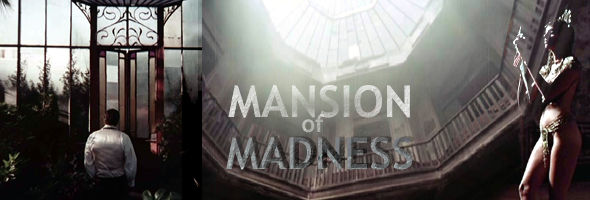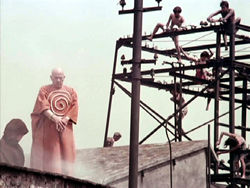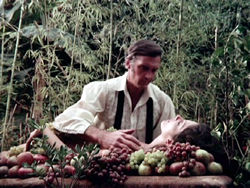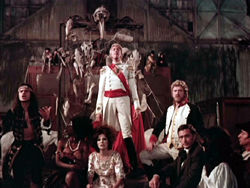



 peculiar adaptation of Edgar Allan Poe’s oft-imitated short story “The System of Doctor Tarr and Professor
peculiar adaptation of Edgar Allan Poe’s oft-imitated short story “The System of Doctor Tarr and Professor  Fether” by way of Marat/Sade, French-born Gastón (Hansel) returns to his homeland after a stay in America and journeys by coach to visit the remote woodland asylum where his father died. Upon arrival he says goodbye to his travel companions, who are promptly set upon by raving bandits in the woods. After passing ominous armed guards, Gastón enters the sanitarium and meets the director, Dr. Maillard (Brook), whose unorthodox methods have the medical community chattering. Though most of the patients are free to wander around the grounds and indulge in their most perverse delusions (including one fellow pretending he’s a chicken, complete with feathers), the “sane” people don’t seem too grounded either; the doctor’s beautiful daughter, Eugenie (Sherman), has an affinity for performance art/dancing that she carries through to a violent conclusion. That night Eugenie secretly meets Gastón and reveals the horrible truth: the doctor is actually a nefarious criminal who has led the patients in a revolt, with the real doctor and staff confined in glass cages within the mansion. The couple’s escape attempt leads to a swift capture and a quick descent into depravity as the residents’ mania threatens to completely overtake their isolated world.
Fether” by way of Marat/Sade, French-born Gastón (Hansel) returns to his homeland after a stay in America and journeys by coach to visit the remote woodland asylum where his father died. Upon arrival he says goodbye to his travel companions, who are promptly set upon by raving bandits in the woods. After passing ominous armed guards, Gastón enters the sanitarium and meets the director, Dr. Maillard (Brook), whose unorthodox methods have the medical community chattering. Though most of the patients are free to wander around the grounds and indulge in their most perverse delusions (including one fellow pretending he’s a chicken, complete with feathers), the “sane” people don’t seem too grounded either; the doctor’s beautiful daughter, Eugenie (Sherman), has an affinity for performance art/dancing that she carries through to a violent conclusion. That night Eugenie secretly meets Gastón and reveals the horrible truth: the doctor is actually a nefarious criminal who has led the patients in a revolt, with the real doctor and staff confined in glass cages within the mansion. The couple’s escape attempt leads to a swift capture and a quick descent into depravity as the residents’ mania threatens to completely overtake their isolated world.  a poster focusing on naked women writhing in cages.
a poster focusing on naked women writhing in cages.  washed-out, muddy video transfers (including a VHS release from Magnum and its inclusion in some bargain bin DVD sets, with Brentwood putting it on a flipper disc with Frankenstein's Great Aunt Tillie, of course) and badly faded, reddish theatrical prints. The opening disclaimer about source damage was barely necessary; the remnants of a few hairline scratches can barely be seen in a few darker scenes but almost all of the film looks fine. Colors are generally muted for the most part (most of the film seems to be taking place at twilight), but the disc shines when it needs to; the bizarre, orgiastic finale in particular is enough to boggle the mind with its intricate, painterly visuals. The first audio option for the film is the standard English soundtrack, with a few previously excised fragments restored with Spanish dialogue (and optional English subtitles). The entire film can also be played with the full Spanish soundtrack (with subs), but considering it was all shot in English and aimed for international distribution, the first language option is the way to go. Many of the extras are ported over from the Alucarda disc including the Moctezuma featurette (13m44s) and interview with Guillermo del Toro (7m31s). You also get the U.S. theatrical trailer (courtesy of Something Weird), a director’s bio, filmography and 1977 text interview, a brief but handy "about the film" essay, a stills gallery, and a Mondo Macabro promo reel.
washed-out, muddy video transfers (including a VHS release from Magnum and its inclusion in some bargain bin DVD sets, with Brentwood putting it on a flipper disc with Frankenstein's Great Aunt Tillie, of course) and badly faded, reddish theatrical prints. The opening disclaimer about source damage was barely necessary; the remnants of a few hairline scratches can barely be seen in a few darker scenes but almost all of the film looks fine. Colors are generally muted for the most part (most of the film seems to be taking place at twilight), but the disc shines when it needs to; the bizarre, orgiastic finale in particular is enough to boggle the mind with its intricate, painterly visuals. The first audio option for the film is the standard English soundtrack, with a few previously excised fragments restored with Spanish dialogue (and optional English subtitles). The entire film can also be played with the full Spanish soundtrack (with subs), but considering it was all shot in English and aimed for international distribution, the first language option is the way to go. Many of the extras are ported over from the Alucarda disc including the Moctezuma featurette (13m44s) and interview with Guillermo del Toro (7m31s). You also get the U.S. theatrical trailer (courtesy of Something Weird), a director’s bio, filmography and 1977 text interview, a brief but handy "about the film" essay, a stills gallery, and a Mondo Macabro promo reel.  with either English SDH or English-translated subtitles. An audio commentary by Mexican film historian and author Francisco Peredo is a thorough study of the influence of classic horror films on this and other Mexican productions, the importance
with either English SDH or English-translated subtitles. An audio commentary by Mexican film historian and author Francisco Peredo is a thorough study of the influence of classic horror films on this and other Mexican productions, the importance  of surrealist artists including Leonora Carrington, the filmmaker's career and the path to making this debut, and other artistic participants who were key in the arts community at the time. It's a solid track, though the subtitles have some odd quirks including references to "Dr. Tart!" "Surreal Experiment" (16m6s) is an interview with actress Ellen Sherman about the wild experience of shooting this film, her perspective as the sole American in the cast, and the astounding nature of the production design and the bizarre moments she go to do on camera. Then in "Room for Play" (5m42s), production designer Gabriel Weisz Carrington gives a quick rundown of his career (now as a theater professor) and his rapport with the director and Jodorowsky in various circles before this film, which required quite a bit of research and nimble thinking to put together the extravagant visuals involving mannequins and dead animals. In "Art in 24 Frames Per Second" (14m28s), the director's daughter, Alessandra Moctezuma, goes into the lessons about fearlessness she learned from him, his inspiring nature as a jack of all trades in the artistic community, and a cultural force of nature who had an impact on those around him. Last but definitely not least is Alucardos: Portrait of a Vampire (88m36s), a 2011 feature documentary about Moctezuma directed by Ulises Guzmán and featuring a number of scholarly participants. It's full of material about the filmmaker's diverse and remarkable life including his dropping out of law school, his detour into jazz, his love of comics, his work as a writer and producer, and of course the films that made him an enduring subject of fascination for fans of wild Mexican cinema. You also get to see the man himself doing some crazy theater work in a Dracula-style outfit talking about his experiences, which is really something to behold. Finally the disc rounds out with the alternate Spanish titles and an HD reconstruction of the English trailer, plus an insert booklet features an Alessandra Moctezuma essay expanding further on the film's script-to-screen process and the clash between reason and fantasy at play in the final result.
of surrealist artists including Leonora Carrington, the filmmaker's career and the path to making this debut, and other artistic participants who were key in the arts community at the time. It's a solid track, though the subtitles have some odd quirks including references to "Dr. Tart!" "Surreal Experiment" (16m6s) is an interview with actress Ellen Sherman about the wild experience of shooting this film, her perspective as the sole American in the cast, and the astounding nature of the production design and the bizarre moments she go to do on camera. Then in "Room for Play" (5m42s), production designer Gabriel Weisz Carrington gives a quick rundown of his career (now as a theater professor) and his rapport with the director and Jodorowsky in various circles before this film, which required quite a bit of research and nimble thinking to put together the extravagant visuals involving mannequins and dead animals. In "Art in 24 Frames Per Second" (14m28s), the director's daughter, Alessandra Moctezuma, goes into the lessons about fearlessness she learned from him, his inspiring nature as a jack of all trades in the artistic community, and a cultural force of nature who had an impact on those around him. Last but definitely not least is Alucardos: Portrait of a Vampire (88m36s), a 2011 feature documentary about Moctezuma directed by Ulises Guzmán and featuring a number of scholarly participants. It's full of material about the filmmaker's diverse and remarkable life including his dropping out of law school, his detour into jazz, his love of comics, his work as a writer and producer, and of course the films that made him an enduring subject of fascination for fans of wild Mexican cinema. You also get to see the man himself doing some crazy theater work in a Dracula-style outfit talking about his experiences, which is really something to behold. Finally the disc rounds out with the alternate Spanish titles and an HD reconstruction of the English trailer, plus an insert booklet features an Alessandra Moctezuma essay expanding further on the film's script-to-screen process and the clash between reason and fantasy at play in the final result.![]()